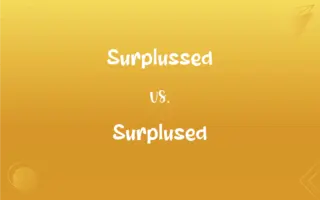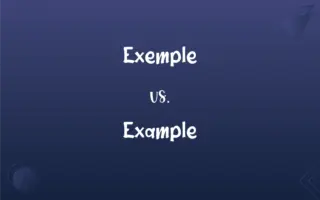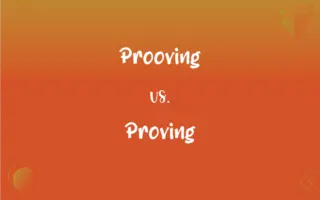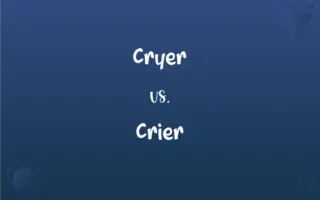Childern vs. Children: Mastering the Correct Spelling
Edited by Aimie Carlson || By Janet White || Updated on March 9, 2024
"Childern" is an incorrect spelling, whereas "Children" is correct, denoting the plural form of "child," referring to young human beings.

Which is correct: Childern or Children
How to spell Children?

Childern is Incorrect

Children is Correct
ADVERTISEMENT
Key Differences
Remember "children" contains the same number of letters as "gentle"; both have eight letters.
Recall "i" before "e" except after "c" - "children" follows this rule, unlike "childern."
Create a mnemonic: "Caring Hearts Inspire Love; Delightful, Enchanting, Radiant Notions" (Children).
Associate "children" with "chill" and "den," imagining kids playing in a cozy den.
Visualize "children" as "child" + "ren" (a short form for 'reindeer'), linking it to the innocence of childhood.
ADVERTISEMENT
Correct usage of Children
Many childern love to read books about adventures.
Many children love to read books about adventures.
The museum offers workshops for childern on weekends.
The museum offers workshops for children on weekends.
We need to ensure the safety of all childern in school.
We need to ensure the safety of all children in school.
The charity focuses on helping underprivileged childern.
The charity focuses on helping underprivileged children.
The park was full of childern playing.
The park was full of children playing.
Children Definitions
Young human beings below the age of puberty.
The park was filled with laughing children.
A group of offspring.
She read a story to the children before bed.
Ones under the care of adults.
The couple decided to adopt two children.
Pupils in a school or learning environment.
The teacher prepared a lesson plan for the children.
Used to address a group, regardless of age.
Alright children, let's get to work!
Plural of child.
Plural of child.
Pl. of Child.
Children Sentences
Many children enjoy playing outside with their friends.
The zoo offers educational tours for children.
Animated movies are popular among children.
It's important to teach children the value of sharing.
Children should be encouraged to explore their interests.
Schools play a crucial role in educating children.
Children often have a vivid imagination.
Children can learn languages more easily at a young age.
Parents strive to provide the best for their children.
It's fun to watch children discover new things.
The park has a playground designed specifically for children.
The festival had many activities geared towards children.
Children often look up to their parents as role models.
Reading to children can help develop their language skills.
Parents often read bedtime stories to their children.
Art classes help children express their creativity.
Sports can teach children about teamwork and discipline.
Educational games can make learning fun for children.
Children need plenty of sleep for their health and growth.
Healthy eating habits are essential for growing children.
It's important for children to learn about nature and wildlife.
Children Idioms & Phrases
Children should be seen and not heard
An old saying suggesting that children should be quiet and not disrupt adults.
At the dinner party, it felt like the rule was children should be seen and not heard.
Children of a lesser god
People of less importance or status.
The documentary highlighted the lives of the children of a lesser god, showing the struggles they face.
The sins of the father are visited upon the children
A phrase suggesting that children may suffer consequences for their parents' actions.
The novel explores the theme that the sins of the father are visited upon the children.
FAQs
What is the verb form of children?
There is no verb form of "children"; it's only a noun.
Why is it called children?
It's called "children" due to its Old English origins, evolving from "cildra/cildru."
Is children a negative or positive word?
It's neutral; context determines its connotation.
What is the root word of children?
The root word is "child," from Old English "cild."
What is the plural form of children?
The plural form is "children" itself.
Which conjunction is used with children?
Conjunctions like "and" or "but" can be used with "children."
What is the first form of children?
The first form is "child."
What is the pronunciation of children?
It's pronounced as /ˈtʃɪldrən/.
Which vowel is used before children?
Usually, the vowel "i" is used before "children."
What is the singular form of children?
The singular form is "child."
Is children an adverb?
No, "children" is not an adverb.
Is children a countable noun?
Yes, "children" is a countable noun.
Is the children term a metaphor?
Typically, no, unless used metaphorically in context.
Is the word children imperative?
No, "children" is not an imperative form.
What is a stressed syllable in children?
The first syllable, "chil," is stressed.
What is the opposite of children?
The opposite could be "adults" or "elders."
How is children used in a sentence?
Example: "The children played happily in the yard."
Which preposition is used with children?
Prepositions like "with," "for," and "of" are commonly used with "children."
Is children a collective noun?
Yes, it can function as a collective noun.
How do we divide children into syllables?
It's divided as chil-dren.
Which determiner is used with children?
Determiners like "the," "some," or "many" are used.
Is children a noun or adjective?
"Children" is a noun.
What is another term for children?
Another term is "youngsters" or "kids."
Is children an abstract noun?
No, it's a concrete noun as it refers to physical beings.
Is children a vowel or consonant?
"Children" is a word, not a vowel or consonant.
What is the second form of children?
"Children" doesn’t have a second form; it remains the same.
What is the third form of children?
Similarly, "children" doesn’t have a third form.
Which article is used with children?
Both "the" and "a/an" can be used, depending on context.
How many syllables are in children?
There are two syllables in "children."
What part of speech is children?
"Children" is a noun.
About Author
Written by
Janet WhiteJanet White has been an esteemed writer and blogger for Difference Wiki. Holding a Master's degree in Science and Medical Journalism from the prestigious Boston University, she has consistently demonstrated her expertise and passion for her field. When she's not immersed in her work, Janet relishes her time exercising, delving into a good book, and cherishing moments with friends and family.
Edited by
Aimie CarlsonAimie Carlson, holding a master's degree in English literature, is a fervent English language enthusiast. She lends her writing talents to Difference Wiki, a prominent website that specializes in comparisons, offering readers insightful analyses that both captivate and inform.


































































